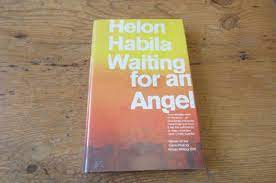Waiting for an Angel explores the themes of literary naturalism of survival, determinism, violence and taboo
Awards-winning Helon Habila’s collection of short stories, Waiting for an Angel, hits the chopping board this week. But here on Inside Literature, we do not chop off, but dissect to critique literary work.
Waiting for an Angel was published in 2002 by Cassava Republic Publishers, Nigeria. It contains seven short stories on 169 pages, and has won both the Commonwealth Writers Prize for new writing and the Caine Prize. It is Habila’s first book.
The seven stories are not really connected in a way stories should be connected except that each character appears in his neighbour’s story in a way that does not move the narrative forward apart from the seventh story titled James which shows how Lomba went to jail. The stories are titled with names of people who know themselves except for the one that gives the book title, The Angel. In The Angel story, the author deals with a taboo and explores the theme of determinism as the main character waits for the angel of death. In all, they are separate stories of different people living in the same area.
The author obeys no rules. Although, we’re taught that there are no rules at all. He engages a curious use of POV adopting at least two different types: third person omniscient and first person point of view in the same narrative.
Theme
Waiting for an Angel explores the themes of literary naturalism of survival, determinism, violence and taboo. The seven stories are not for the fainthearted. The author in tandem with naturalism’s detailed realism which always implies that human life is shaped by social conditions, heredity and the environment and cannot be avoided, x-rays the lives of Lomba, Bola, Kela, Alice and James amongst other minor characters. These characters are caught in the quagmire of penury and terrible social condition, violence as well as fatalism.
READ ALSO:
BBNaija Angel pens down emotional tribute to late boyfriend
So, the first short story titled, Lomba, explores the theme of life in Nigerian prison as a young journalist spends life in prison with no trial in view as a political prisoner. And what kind of a political prisoner is the journalist? He’s not a dissident, but rather a reporter who’s gone to cover a peaceful demonstration!
We see the dehumanisation of Nigerian citizens and not rehabilitation in Nigerian prisons. We see a military government in power that is set to crush spirits of the ruled and not to rejuvenate them.
Lomba is the journalist who is confined in prison for no crime at all except for the inability of the military to administer civil society. The military has no business in governance since they have no education in that field. They tolerate no freedom of expression being jittery and volatile. And Habila places within the story one who represents the military government well, in attitude and behaviour, in the person of the superintendent of the prison.
The themes of dehumanisation and lack of freedom of expression (as seen during military rule in Nigeria) are explored as we see Lomba beaten and thrown into solitary because he is writing to express himself in order not to run mad. Lomba and others languish in prison without trial, fair or unfair. The military that is equipped to fight wars seizes and wields power over civil society ruling with military might thereby reducing society to either silence, or the gibberish petrified subhumans we encounter in prison. Nigerian citizens are thrown into hardship, violence, degradation, with all their human rights denied.
Storyline or Plot
The first story titled Lomba starts with the third person omniscient point of view, then switches to first person point of view where the main character takes over the narrative and returns to the third person POV again.
Lomba is in his second year in prison. Something good has just happened to him: he’s gotten hold of some papers and a pencil. So, he starts a journal, but has to wait till the wee hours of the morning when the prison guards are tired of peeping at prisoners through the door bars and are now impatient for those who will relieve them from the night shift to arrive. Lomba has lost the sense of time, and therefore misses correct dates when he writes.
As a political prisoner, Lomba writes his journal in secret for two months, all the time anticipating being caught. He writes letters he cannot send; poems, soliloquies, internal monologues, and stuff. The day his cell door opens and the prison superintendent, a fierce volatile, tall and stout fellow who halts in speech, bursts in with his human hounds, he knows it is for him and does not hesitate to own his name and steps forward. The superintendent announces his crime and the hounds search for his writings and his work instruments.
They beat him up and the superintendent crushes his boot on Lomba’s head. He promises Lomba solitary isolation as his punishment before going away with his stuff, his brainchild, that which is rejuvenating him, revivifying his humanness.
Regular prison, Lomba writes, which “chains not so much your hands and feet as it does your voice”, is nothing compared to the dehumanising effects of waiting (for judgement or punishment) and of going into solitary which is the worst punishment in prison barring prisoners from light and company as long as the jailers please! One can lose one’s mind in solitary.
We see on page 10, after a failed attempt by two inmates to escape, the superintendent lines up the prisoners and spews venom on them. When he leaves, a grown man who just returned from a week solitary loses it and breaks down completely snivelling and weeping.
Lomba spends an agonising gruesome two days before he’s thrown into solitary. In solitary, day and night have no difference – it is perpetual darkness (I wonder how hell will be – God forbid!). On the third day of his solitary punishment, he hears the locks of his solitary cell open and the superintendent comes in leaving the cell door open for Lomba to glimpse light in three days!
The poems have bought Lomba freedom. The superintendent is carrying a candle for a teacher in his son’s former school. Having read through Lomba’s writing, he thinks his poems can help him win the lady’s heart. Thus, in exchange for writing love poems for the jailer’s love object, English Teacher Janice, Lomba regains the freedom from solitary to regular cell, gets cigarettes, soap and a book to read. So, he’s allowed to start writing again, this time, love poems to Janice. In the course of it, he begins to send SOS to the unknown lady.
The short story titled Lomba reaches climax as Janice visits the prison to see the writer of the poems. As she tells Lomba when they meet that she knew that the superintendent could not write such poems although he gives them to her as his own work.
Lomba meets Janice; they converse briefly in the superintendent’s office about the poems she receives, the SOS, and the jailer. The superintendent has just ‘stepped out’ probably to attend to important businesses. Janice tells Lomba that the jailer is actually a good person and she’s looking forward to marrying him. But Lomba being close to a decent human being like Janice after almost two years in confinement is overwhelmed with his condition (endless jail term, no end in sight as there’s no date of trial) and the lady’s kindness. The jailer returns to find the broken prisoner weeping on his lover’s ample bosom!
He asks why Lomba cries. Janice tells him and begs him to help Lomba. The superintendent says he has no such power. But on second thought he mentions how some human rights activists visited the prison inquiring if there were political prisoners they could help. He confesses that he thought Lomba was comfortable as he receives soaps and cigarettes and books from him. On hearing this, Janice becomes livid with rage and tells him that if he doesn’t do something for the poor boy, he’ll not see her face again. With that she marches out of his office.
Lomba is asked to return to his cell.
The author continues the story in the third person omniscient point of view and finishes that no one knows what happens to Lomba after Janice’s visit as there is a counter coup d’état in the country.
So, the story ends in hopelessness.
Diction
The author chooses the past tense when writing in the third person omniscient point of view, while Lomba narrates in present tense in the first person point of view.
Lomba, the short story, is written in simple descriptive British English. The author chooses concrete words like toilet, bath-stall, anus, tenterhooks, snots, tears, saliva to deliver his story. There are poems, not poetry.
The prison superintendent speaks in jerky mutilated words like, “Search. More”; “I will ask. Once. Who gave you. Papers?” His speech reminds me of a stutterer. Words are expressive enough painting the picture of the prison reality: the filth, degradation, anger and insanity found there. For example, “Some of the inmates gasped, shocked; they mistook my answer for reckless intrepidity”; “The two dogs with him lick their chops and growled”; “The prisoner had come out of a bath-stall and there was the warder before him monitoring the morning ablutions. Suddenly the prisoner leaped upon him, pulling him by the neck to the ground, grinding him into the black, slimy water that ran in the gutter from the toilets.”
Although there are metaphors, an attempt at figurative language, but there are no euphemisms. Habila writes it raw in tandem with naturalism exposition of low life living.
Structure
The author wrote the short story, Lomba, in both the third person point of view and the first person point of view to expose the main character’s state of mind as well as tell readers things beyond the scope of the political prisoner. Through this structure, we learn something of the political situation outside the prison, like the coup, and the superintendent’s love life which moves the story forward.
So, we see the political prisoner’s need to write in order to retain his sanity; his writing is discovered. This brings in the brutal beastly superintendent into the story to deal with this flouting of prison rules. The right punishment is meted out to the prisoner. But the jailer returning to his office and going through Lomba’s writings discovers he writes good poems which may help him win the love of a lady he is interested in.
This discovery moves the story forward to the superintendent returning to see Lomba in solitary. On the agreement that Lomba will be writing for him love poems for his lady love, he regains freedom from solitary to regular cell.
The love poems pave way for Lomba’s contact with the outside world as Janice demands the identity of the real poet and visits the prison to see him. The visits ends in the teacher, Janice, who is the superintendent’s love interest making a demand on her lover to help get the incarcerated journalist out of prison.
Although the story ends in seemingly hopelessness, but there is a ray of hope that if the superintendent must have his lady’s love, he must do something to help Lomba. At least Lomba will not be forgotten in prison, someone who wields the power of love over the jailer has Lomba’s interest at heart.

Setting
The short story, Lomba, is physically set in a prison and a scene set outside the walls of a prison, in a restaurant. Through the eyes of the political prisoner, Lomba, we see the horrid prison condition: the confined space, the unhygienic situation, the threadbare and age-worn dirty props, the hunger-ravaged inmates with eczema/ringworms eaten skin, etc.
In prison, we see the meagre meal of watery beans that prisoners eat, juxtaposed with the sumptuous meal and available table wine that the jailer shares with his love interest.
A life of freedom, fresh salubrious air and plenty food and wine, is set side by side with a life of lost freedom, crowded space, awful human excrement and sweat smell. In the former, there is an opportunity to express one’s self with food, love poems and actions, and for the latter, expression of feelings, voice and desire, is denied.
We see the state of dehumanisation that man is brought to in prison. We see the injustice of a political prisoner not allowed a trial at all. We see subjugation. We read about a government not open to even ordinary expression of opinions or feelings of the people they rule over.
Life is gloomy in prison. The mood is sad, pathetic. Time crawls. There’s hopelessness, despair, ennui. The environment is a shithole. Clothing is worn out, threadbare. We see the different concerns of the different characters: the superintendent, the warders, the prison female admin staff who spend their time gossiping while the prisoners languish, hunger, thirst, in need of fresh air and justice.
POV
Points of view, as we observe above, are two different types used in Lomba, the first short story. The third person omniscient point of view is used, interchanged with the first person narrative.
Characterisation
Characters are people in the story. We see Lomba, a young journalist who has lost his freedom languishing in jail. He has lost his identity, his humanness, and who he is. He struggles not to go mad by writing to hold his mind in. We see other prisoners – faceless, nameless, broken – they’ve lost their identities, showing what confinement does to people. We see them cringe before the authority, the superintendent, who can harm them more. The superintendent is powerful, short-tempered, brutal, wielding his power like a rod. His mutilated speech symbolic of uncontrollable anger and intolerance just like the military government.
It is worthy of note that not only are the prisoners reduced to subhumans, they are also made to be suspicious of one another. Who knows who’s the tatler, who reported Lomba to the authorities. Later, Lomba himself is also a suspect. His fellow prisoners wonders if he has turned an informer.
We see Janice, the English teacher, from civil society, fresh, plump, soft and nice. We see nameless female prison staff gossiping with plenty idle time on their hands without a care in the world. These are juxtaposed with the dehumanised suffering humanity in prison.
For errors, none is seen. Helon Habila is a creative writing lecturer, and cannot but shows that he knows his onion in prose-writing through penning a story with a solid blueprint to showcase life of squalor under the military government in Nigeria. Employing the tools of the school of thought of literary naturalism, Habila weaves a sad tale in Lomba.
And for those looking for character development, the superintendent seems to be on the verge of becoming a better person. As Janice leaves in anger, he is sober, reflective. So, there is hope that he may change. Generally, there’s depreciation of self-worth going on among the prisoners.













